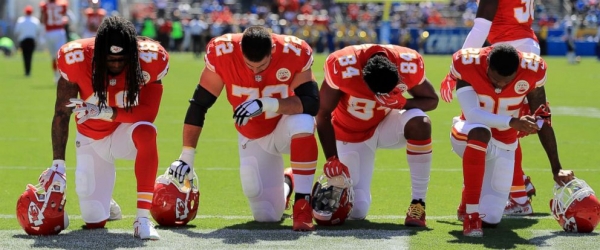On Sept. 12, Donald Trump spoke out against NFL players who took a stand against police brutality during the pre-game rendition of “The Star Spangled Banner.”
“Wouldn’t you love to see one of these NFL owners, when somebody disrespects our flag, to say ‘Get that son of a bitch off the field right now’,” Trump said. “Out! He’s fired! He’s fired!”
Players are often reminded that their job remains on the field, the ice, or the court—not commenting on social issues. Truthfully though, athletes can and should create real change by standing up—or in this case, kneeling—for what they believe in. Since Trump’s comments, major-leaguers have done just that, embracing their platform for protest. Athletes have knelt, locked arms, and openly spoken out against racial injustice. The mass coverage and general support these protests have garnered is telling of the capacity that athletes have to inspire change.
With such a huge platform, and such a diverse audience, professional athletes shouldn't be criticized for stating their opinions. Athletes have an unusual ability to resonate with many different audiences because of their broad viewer and listener base. Be it LeBron James’ statements, Denasia Lawrence’s national anthem, or the cover of TIME magazine, it’s hard to ignore the reach of these movements.
The debate over whether athletes should stick to sports is not new. Decades ago, Muhammad Ali, Jesse Owens, and Tommie Smith preceded the likes of Eric Reid and Bruce Maxwell in fighting against racial inequality through sport. Maxwell, the first MLB player to kneel and whose father served 30 years in the army, has publicly proclaimed his love for his country, reminding audiences that this protest isn’t against the United States or its military. Indeed, football players began locking arms and taking a knee in contempt of realities in today’s America—of Ferguson, of Baltimore, of every cop shooting, and of over 200 years of systemic oppression. And it’s working: If nothing else, these protests have ignited a conversation. In a new age of media and information, this is often how change takes place.
The two arenas of sports and politics have always been intertwined, but have become nearly inseparable in recent years, due in large part to the rise of social media. The connection is impossible to ignore: Athletes are in the public eye, acting as role models to many. Especially in the NFL, where 70 per cent of players identify as African-American, issues of racial inequality are more personal. This is their reality, and it doesn’t belong to their critics. In a way, these athletes are public representatives, using their platforms to speak up for those who didn’t get the same break, and rarely have champions to vouch for their interests.
Players have shown—particularly in the past month—that they deserve a voice, and that their opinions matter. It is unconstitutional to try to silence them under the pretense that social issues are not their business. When NFL players are told to stick to sports, just as commentators told the Dixie Chicks to “shut up and sing,” it silences a group of minds and goes against the principles of free speech.
Thirteen months ago, Colin Kaepernick said that he wouldn’t “stand up to show pride in a flag for a country that oppresses black people,” but only now has his sentiment truly picked up steam. Sometimes, the only way to get attention is through controversy. One way to inspire change is to anger the right people. Athletes currently have the best platform to do so.
If Donald Trump thinks that he can divide the NFL, he’s wrong. And if supporting what you believe in makes you unpatriotic and disrespectful, then Baltimore Ravens linebacker Terrell Suggs has it right: “I guess we’re all sons of bitches.”









It is easy for people to say that during the national anthem, “Protesting is disrespectful”. And in truth if you never saw a game or anything, it is probably true, and depending on the level of protest it might be illegal. So that word “protest” is called spin. If you say, “kneeling is disrespectful”, it is necessary for the opposition to argue some thought police argument to say this is truth. They are just kneeling, not screaming for justice over the anthem. But another sentence is even closer, because some people seem to feel that the word kneeling is akin to submission. Let us spread the truth. They are genuflecting.
GENUFLECTING- “lower one’s body briefly by bending one knee to the ground, typically in worship or as a sign of respect.”
Then we would be at the truth, and only one person would be able to continue arguing that Genuflecting is disrespectful, that of course is our Emperor without Clothes.